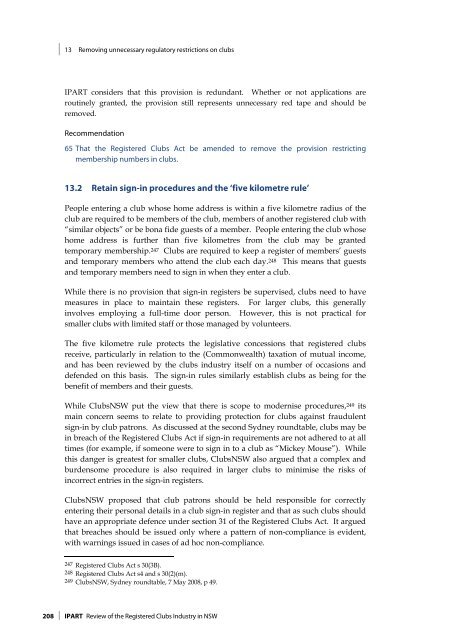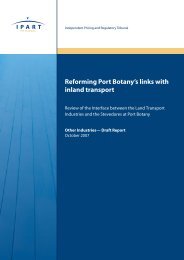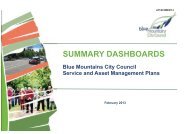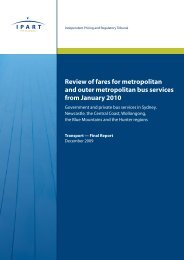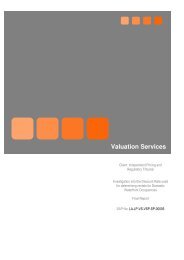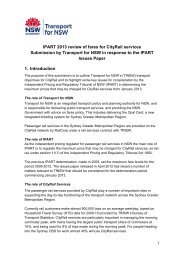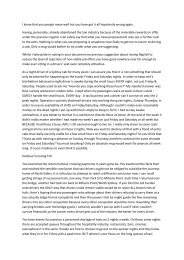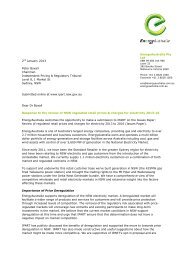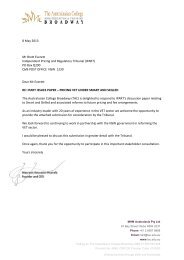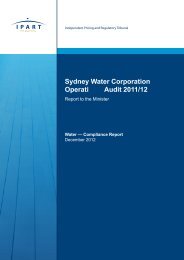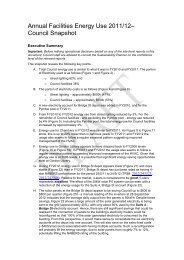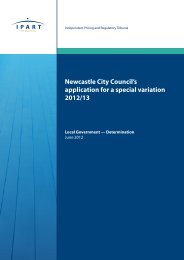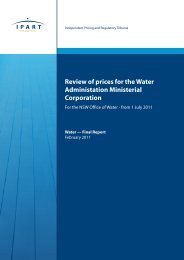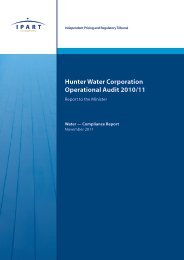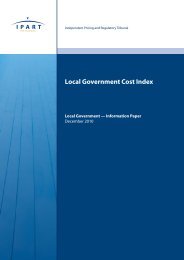Review of the Registered Clubs Industry in NSW - Clubs NSW
Review of the Registered Clubs Industry in NSW - Clubs NSW
Review of the Registered Clubs Industry in NSW - Clubs NSW
You also want an ePaper? Increase the reach of your titles
YUMPU automatically turns print PDFs into web optimized ePapers that Google loves.
13 Remov<strong>in</strong>g unnecessary regulatory restrictions on clubs<br />
IPART considers that this provision is redundant. Whe<strong>the</strong>r or not applications are<br />
rout<strong>in</strong>ely granted, <strong>the</strong> provision still represents unnecessary red tape and should be<br />
removed.<br />
Recommendation<br />
65 That <strong>the</strong> <strong>Registered</strong> <strong>Clubs</strong> Act be amended to remove <strong>the</strong> provision restrict<strong>in</strong>g<br />
membership numbers <strong>in</strong> clubs.<br />
13.2 Reta<strong>in</strong> sign-<strong>in</strong> procedures and <strong>the</strong> ‘five kilometre rule’<br />
People enter<strong>in</strong>g a club whose home address is with<strong>in</strong> a five kilometre radius <strong>of</strong> <strong>the</strong><br />
club are required to be members <strong>of</strong> <strong>the</strong> club, members <strong>of</strong> ano<strong>the</strong>r registered club with<br />
“similar objects” or be bona fide guests <strong>of</strong> a member. People enter<strong>in</strong>g <strong>the</strong> club whose<br />
home address is fur<strong>the</strong>r than five kilometres from <strong>the</strong> club may be granted<br />
temporary membership. 247 <strong>Clubs</strong> are required to keep a register <strong>of</strong> members’ guests<br />
and temporary members who attend <strong>the</strong> club each day. 248 This means that guests<br />
and temporary members need to sign <strong>in</strong> when <strong>the</strong>y enter a club.<br />
While <strong>the</strong>re is no provision that sign-<strong>in</strong> registers be supervised, clubs need to have<br />
measures <strong>in</strong> place to ma<strong>in</strong>ta<strong>in</strong> <strong>the</strong>se registers. For larger clubs, this generally<br />
<strong>in</strong>volves employ<strong>in</strong>g a full-time door person. However, this is not practical for<br />
smaller clubs with limited staff or those managed by volunteers.<br />
The five kilometre rule protects <strong>the</strong> legislative concessions that registered clubs<br />
receive, particularly <strong>in</strong> relation to <strong>the</strong> (Commonwealth) taxation <strong>of</strong> mutual <strong>in</strong>come,<br />
and has been reviewed by <strong>the</strong> clubs <strong>in</strong>dustry itself on a number <strong>of</strong> occasions and<br />
defended on this basis. The sign-<strong>in</strong> rules similarly establish clubs as be<strong>in</strong>g for <strong>the</strong><br />
benefit <strong>of</strong> members and <strong>the</strong>ir guests.<br />
While <strong>Clubs</strong><strong>NSW</strong> put <strong>the</strong> view that <strong>the</strong>re is scope to modernise procedures, 249 its<br />
ma<strong>in</strong> concern seems to relate to provid<strong>in</strong>g protection for clubs aga<strong>in</strong>st fraudulent<br />
sign-<strong>in</strong> by club patrons. As discussed at <strong>the</strong> second Sydney roundtable, clubs may be<br />
<strong>in</strong> breach <strong>of</strong> <strong>the</strong> <strong>Registered</strong> <strong>Clubs</strong> Act if sign-<strong>in</strong> requirements are not adhered to at all<br />
times (for example, if someone were to sign <strong>in</strong> to a club as “Mickey Mouse”). While<br />
this danger is greatest for smaller clubs, <strong>Clubs</strong><strong>NSW</strong> also argued that a complex and<br />
burdensome procedure is also required <strong>in</strong> larger clubs to m<strong>in</strong>imise <strong>the</strong> risks <strong>of</strong><br />
<strong>in</strong>correct entries <strong>in</strong> <strong>the</strong> sign-<strong>in</strong> registers.<br />
<strong>Clubs</strong><strong>NSW</strong> proposed that club patrons should be held responsible for correctly<br />
enter<strong>in</strong>g <strong>the</strong>ir personal details <strong>in</strong> a club sign-<strong>in</strong> register and that as such clubs should<br />
have an appropriate defence under section 31 <strong>of</strong> <strong>the</strong> <strong>Registered</strong> <strong>Clubs</strong> Act. It argued<br />
that breaches should be issued only where a pattern <strong>of</strong> non-compliance is evident,<br />
with warn<strong>in</strong>gs issued <strong>in</strong> cases <strong>of</strong> ad hoc non-compliance.<br />
247 <strong>Registered</strong> <strong>Clubs</strong> Act s 30(3B).<br />
248 <strong>Registered</strong> <strong>Clubs</strong> Act s4 and s 30(2)(m).<br />
249 <strong>Clubs</strong><strong>NSW</strong>, Sydney roundtable, 7 May 2008, p 49.<br />
208 IPART <strong>Review</strong> <strong>of</strong> <strong>the</strong> <strong>Registered</strong> <strong>Clubs</strong> <strong>Industry</strong> <strong>in</strong> <strong>NSW</strong>


